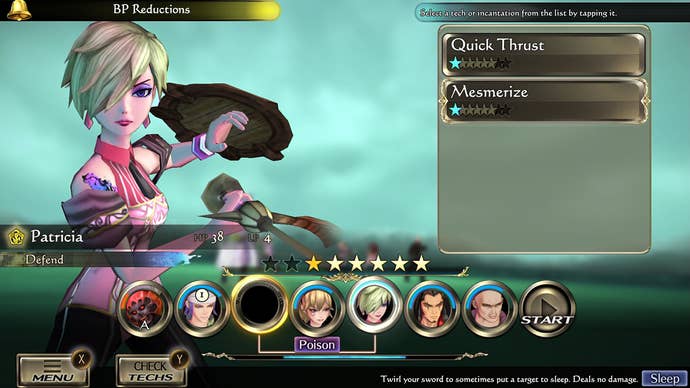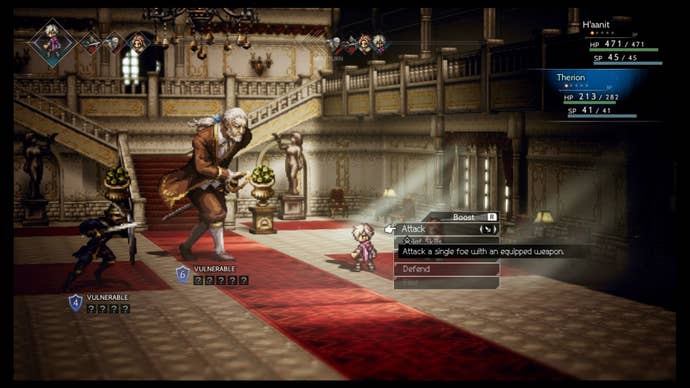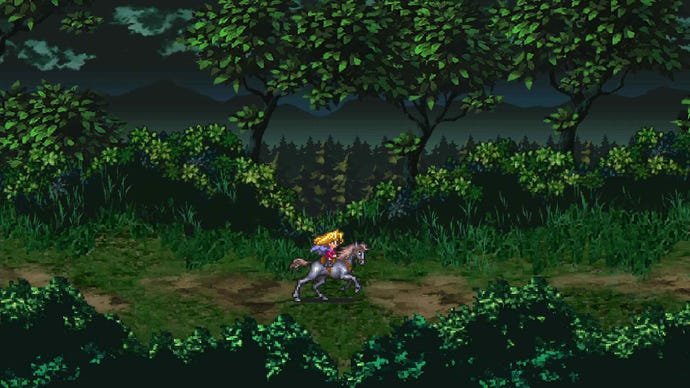Catching Up With Kawazu: The Legendary RPG Developer Talks SaGa and Why We Shouldn't Call Everything an RPG
SaGa series Director Akitoshi Kawazu and Producer Masanori Ichikawa talk to us about the series' revival in the West, Final Fantasy Legend, and the industry's tendency to call everything an "RPG."
This article first appeared on USgamer, a partner publication of VG247. Some content, such as this article, has been migrated to VG247 for posterity after USgamer's closure - but it has not been edited or further vetted by the VG247 team.
RPG fans generally look back on the '90s as a golden age, but there's no question that wonderful chapter of the genre's history was missing some pages in the west. Even titles that didn't go missing sometimes had their names crossed out and re-written, thus muddying up their histories. Square Enix's SaGa series has examples of both practices: Its games have been both renamed and outright shunned as a translation candidate.
The first three SaGa games came to the Game Boy as Final Fantasy Legend, Final Fantasy Legend 2, and Final Fantasy Legend 3 between 1990 and 1993. SaGa's gameplay is generally more open-ended and systems-based than early Final Fantasy games, so people who enjoyed Final Fantasy games found themselves perplexed about why the Game Boy installments involved force-feeding meat to mutants to help them grow. After Legend 3, the SaGa/Final Fantasy Legend series skipped localization altogether for years, outside of sporadic, low-key releases. Westerners missed out on some of SaGa's most beloved games, including 1995's Romancing SaGa 3 for the Super Famicom.
The fandoms of 2019 enjoy a comparative feast of information and access to these "lost" RPGs. The full history of the SaGa series is one click away on Google, and better still, Square Enix is working hard to give us Westerners the "missing" pieces of SaGa's history. The translation and release of Seiken Densetsu 3/Trials of Mana is one example; the recent localization of Romancing SaGa 3 and SaGa Scarlet Grace: Ambitions for the Switch, PlayStation 4, and PS Vita(!) is another.
I recently interviewed SaGa Producer Masanori Ichikawa and SaGa Director Akitoshi Kawazu about the series' second chance at life in the West, and how its revival makes them feel. We also talk about Octopath Traveler, the Final Fantasy Legends name change, and most importantly: Why are Romancing SaGa 3 and SaGa: Scarlet Grace Ambitions coming to the PS Vita when the poor handheld is already stiff with rigor motris?
Usgamer: The localization history for the SaGa games has been a little fragmented in North America. Does it disappoint you that it took so long for Romancing SaGa 3 to come to the West, or are you just excited that it's finally happening?
Akitoshi Kawazu, SaGa series Director: Following in the footsteps of Romancing SaGa: Minstrel Song and Romancing SaGa 2, I’m truly happy that we are able to release Romancing SaGa 3 in the West.
Masanori Ichikawa, SaGa series Producer: As a producer, and as a person who played Romancing SaGa titles as a child, I am terribly sorry that we hadn’t been able create a framework to allow the overseas SaGa fans to play the SaGa series game for a very long time. Even though we had received numerous messages from the fans asking us to bring the series to the west, we hadn’t been able to do so. But I am happy that we are moving toward this goal, little by little.
The story for Romancing SaGa 3 revolves around a "death eclipse" and a few destined beings who survive the purge to become great villains or heroes. I think this is a very interesting concept. How did you come up with the idea of the eclipse? Why did you decide to base SaGa 3's story around it?
AK: The East and the West share the same superstition that an eclipse is an ominous occurrence. “What if this weren’t just a superstition, but a reality?” This idea was the seed of this game’s concept. When the sun, which is symbolic of life, is overshadowed, many lives are lost. If any are to survive this incident, they must be a special being. I took that idea of a special being and expanded on it; this idea became Romancing SaGa 3.

As you probably know, the early SaGa games for the Game Boy were released in the West under the "Final Fantasy Legend" name. Did it bother you that the West categorized SaGa as a Final Fantasy game at the time?
AK: Back then, Square, as a publisher, was desperate to have its name known in the West. This is why it was trying to create a very simple “Square = FINAL FANTASY” formula. As such, SaGa and Mana series titles were released under the FINAL FANTASY name. But in the end, it seems people felt something was off when games with completely different contents were released under the same series name.
I'm glad SaGa 3 is coming to the Vita. Are you a fan of the system? Why was it decided to bring SaGa 3 to the Vita?
AK: At the end of the day, the origin of the SaGa series lies in portable gaming consoles. That is why I think it is natural for us to support portable gaming consoles. Additionally, since we released SaGa SCARLET GRACE on the PS Vita, we felt that we needed to release Romancing SaGa 3 on the PS Vita for the PS Vita users who supported us by playing that title.

MI: The “first” SaGa SCARLET GRACE (different from SaGa SCARLET GRACE: AMIBITIONS, which is slated for release on December 3rd) was released on the PS Vita. Additionally, the remastered version of Romancing SaGa 2 was released on eight platforms, but it sold the best on the PS Vita.
These two titles served as the beginning of the revival for the SaGa series, and there were many fans who purchased the PS Vita when these titles were released. Could we betray these fans? Of course not.
Upon releasing this title on eight platforms, we viewed all of them to have equal value, but we do have our own reasons to also bring the game to the PS Vita.
Like a lot of RPGs at the time, SaGa 3 for the Super Famicom never made it to the West because RPGs just weren't popular enough to invest the time and money necessary to translate them. Now RPGs enjoy mainstream popularity worldwide. You've been making RPGs for a long time. How does it feel to finally see the world enjoy RPGs together?
AK: I’m extremely happy. But on the other hand, I do feel there are too many games that are categorized as RPGs just because there are battles and a character development element to them. It’s not uncommon to come across games that have no character role-playing elements to them at all. We intend to continue valuing the role-playing gaming style for the SaGa series.

Have you been playing any good RPGs lately? Or have you been playing and enjoying any games recently?
AK: My child and I are planning to split the load and play one each of Pokémon Sword and Pokémon Shield!
MI: I’m currently playing Undertale with my sons. It’s an amazing experience.
Have you had a chance to play Octopath Traveler? That's a game that takes a good deal of inspiration from the SaGa games. If you've played Octopath Traveler, what did you think of it?
MI: I have known Asano-san and Takahashi-san of the OCTOPATH TRAVELER team for a long time, and I communicate with them on a regular basis. I joined the company around the same time as Asano-san, so I would consider us friends.I think it is a very thoughtful game that is conscious of current players who are also into things that are old-school.
For people who enjoyed playing Octopath Traveler, I hope you give Romancing SaGa 3 a try. I imagine a lot of creators who worked on Octopath Traveler have respect for Romancing SaGa 3.
Kat and I recently talked a bit about Romancing SaGa 3 on the Axe of the Blood God RPG podcast. Listen, subscribe, and tell your friends.


